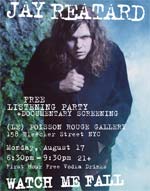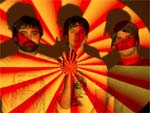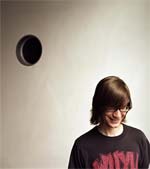| |
|
|
|
|
|
|
| |

$15.99 CDx2


|
|
KHALED
Rebel of Rai
(Nascente)
 "La Camel" "La Camel"
 "Maghboun" "Maghboun"
The story of Algerian rai is a complex one, from its roots in the classical sung poetry (malhoun) of the Maghreb, to the urban experience of the chebs and chabas (young people) that modernized and sang it, and its syncretization of everything from Bedouin festival music, French cabaret and Oran's wahrani sound to the Bee Gees, Johnny Hallyday, and Julio Iglesias. One simple fact, however, is that, for over thirty years, Khaled has remained its biggest star. The two discs of Rebel of Rai, drawing from the late '70s through the early '90s -- the most prolific period for both Khaled as an artist and for rai as a musical and social phenomenon -- prove why.
Rai, a predominantly underclass music that often deals with earthy themes prohibited by strict readings of Islam, had existed in Algeria since at least the 1930s, but became increasingly visible and popular in the late '70s as singers like Houari Benchenet, Cheb Sahraoui, Chaba Fadela, and Cheb Khaled (as he was then known), born just before Algerian independence, came of age in Oran. By the early '80s, nightclubs, the radio, and both local and French newspapers began championing the music and its singers -- despite the vociferous (and dangerous) opposition it engendered from Islamic fundamentalists -- and it soon became Algeria's predominant form of pop music.
There's no doubt that in the past, rai was a kind of "rebel music" to many of its young singers and fans, but this set's title -- Rebel of Rai -- is a bit of a misnomer, as Khaled is hardly the genre's prodigal son, but instead its most mainstream and successful purveyor, and the embodiment of its popular evolution. And he is also one of the very best. His songs are irresistible, owing to his melodies, his rhythms, and the power, urgency, and utter personality of his voice. He, like most rai artists, eagerly embraced the synthesizer and drum machine after their introduction to the scene in 1982, and Rebel of Rai flows through rai's technological development, from bedroom keyboards to slick studio arrangements. There is just one tune from the analog '70s here, "Trig Lycée," with the ever-present accordion of that era of rai. Though I might have liked more to be included, this offers a nice glimpse of where Khaled's music came from, while the rest of the set illustrates how quickly he adapted to and mastered the new technology, made dozens of killer records to prove it, and became, as he's commonly known, the King of Rai. [NS] |
|
| |
|
|
|
|
|
|
|




 Photo Credit:
Photo Credit: 


















